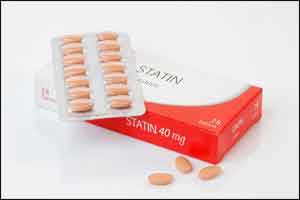- Home
- Editorial
- News
- Practice Guidelines
- Anesthesiology Guidelines
- Cancer Guidelines
- Cardiac Sciences Guidelines
- Critical Care Guidelines
- Dentistry Guidelines
- Dermatology Guidelines
- Diabetes and Endo Guidelines
- Diagnostics Guidelines
- ENT Guidelines
- Featured Practice Guidelines
- Gastroenterology Guidelines
- Geriatrics Guidelines
- Medicine Guidelines
- Nephrology Guidelines
- Neurosciences Guidelines
- Obs and Gynae Guidelines
- Ophthalmology Guidelines
- Orthopaedics Guidelines
- Paediatrics Guidelines
- Psychiatry Guidelines
- Pulmonology Guidelines
- Radiology Guidelines
- Surgery Guidelines
- Urology Guidelines
Compared to cardiac patients less number of stroke survivors prescribed Statins: Study

Stroke patients less likely to be prescribed Statins compared to cardiac patients for lowering low density lipoprotein cholesterol, finds new study.
Those with cerebrovascular disease were 36% less likely than those with heart disease to receive statin therapy, and 40% less likely to receive statins at the recommended dose.This is despite the fact that benefit of lowering low density lipoprotein cholesterol is similar in both groups of patients. The new study has been published in the Journal of the American Heart Association.
Statins help protect the heart and brain by preventing artery plaques — buildups of cholesterol, calcium and other substances in blood vessels — from blocking blood flow and causing a heart attack or stroke. For patients with a history of such conditions, guidelines
In the new study, researchers examined more than 3,200 patient records from 2015. About 2,200 had heart disease, including previous heart attack or coronary bypass. About 400 had a history of cerebrovascular disease — stroke, mini-stroke or carotid artery narrowing. The rest had both heart and cerebrovascular disease.
People with both heart and cerebrovascular disease had similar statin use and intensity as those with heart disease only. The three groups did not differ in reported side effects or beliefs about statins' safety and effectiveness or cardiovascular disease risk.
"The more low density lipoprotein cholesterol is reduced on statin therapy, the greater benefit in terms of cardiovascular disease risk reduction," said the study's lead author, Dr. Ying Xian. But while 84% of all patients in the study received statins, fewer than half did at recommended levels.
Some patients don't tolerate statins well. But other factors also might cause their underuse — such as fear the drugs could trigger a bleeding stroke, said Xian, associate professor of neurology and medicine at Duke Clinical Research Institute in Durham, North Carolina. Although that concern is debated, he said, evidence is overwhelming that any risk of such a stroke is offset by the benefit of preventing other cardiovascular diseases.
But there might be other reasons for statin underuse in people with cerebrovascular disease, said Dr. Dawn Bravata, who studies the care of such patients. Maybe they are more likely than people with heart disease to have medical circumstances that give doctors pause about aggressive cholesterol-lowering therapy, such as prior bleeding inside the skull. Bravata, a professor of medicine and adjunct professor of neurology at Indiana University School of Medicine, was not involved in the new study.
Other research also has found heart attack survivors are more likely to receive direct follow-up care than stroke survivors — and that care is linked to improved risk factor management. Perhaps primary care providers and neurologists, the doctors most likely to care for cerebrovascular patients, are less likely than cardiologists to prescribe statins as recommended, Bravata said.
To ensure appropriate prescription of statins, Xian said doctors should use risk assessment tools, discuss risks and treatments with patients, and understand their concerns.
"Patients should be more proactive about their own health," he added. "For both healthy people and individuals who already have atherosclerotic cardiovascular disease, most people can reduce their risk through healthier lifestyle changes."
Next Story
NO DATA FOUND

Disclaimer: This site is primarily intended for healthcare professionals. Any content/information on this website does not replace the advice of medical and/or health professionals and should not be construed as medical/diagnostic advice/endorsement or prescription. Use of this site is subject to our terms of use, privacy policy, advertisement policy. © 2020 Minerva Medical Treatment Pvt Ltd